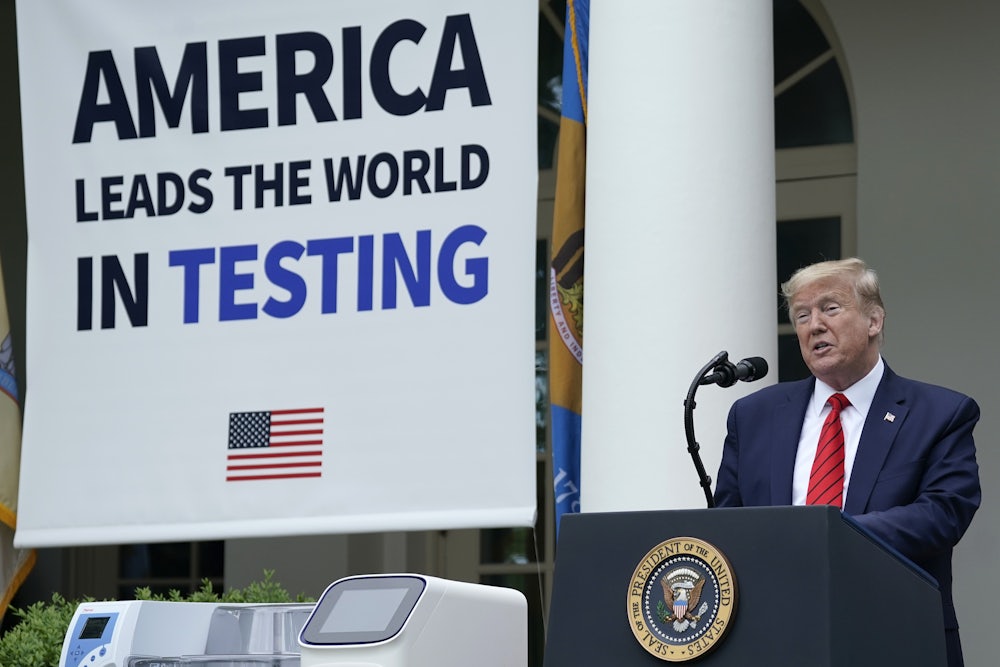It should be plain to all by now that America has not only lost control of the coronavirus pandemic, it has also given up on the possibility of regaining the upper hand. On Wednesday, over 59,000 new cases were reported, setting a new national record for the fifth time in nine days. Predictably, much of the new growth has been coming from the South, where conservative lawmakers, like the president, have pushed for the reopening of nonessential businesses and a return to normal behavior. Texas alone reported nearly 10,000 cases on Wednesday; the same day, authorities in Tulsa, Oklahoma, told the press that President Donald Trump’s June rally “more than likely” contributed to a dramatic spike in infections in that city.
But the march to deeper catastrophe continues. It was announced at a Wednesday press conference that the Centers for Disease Control and Prevention would issue new, more lenient guidelines on reopening schools—not long after tweets from Trump criticizing the agency and threatening to cut federal funding to schools that stay closed in the fall. All told, many more people will die needlessly as the year wears on. If masks are not universally used, the collected toll will reach more than 200,000 by November, according to a model from the University of Washington.
That fact is being assimilated into the president’s defensive reelection strategy. “The goal is to convince Americans that they can live with the virus—that schools should reopen, professional sports should return, a vaccine is likely to arrive by the end of the year and the economy will continue to improve,” The Washington Post’s Yasmeen Abutaleb and Josh Dawsey wrote, adding that the White House “hope[s] Americans will grow numb to the escalating death toll and learn to accept tens of thousands of new cases a day.”
That hope is both evil and already being borne out, at least among the 40 percent of the country that, now as ever, doggedly supports the president. But even in the world outside Red America, outrage over the article lasted about a quarter of a news cycle. The president’s expectation, that the country will come to accept deaths that his actions and recommendations are even now actively increasing, is no longer a headline story. The nominal opposition party in Congress isn’t running before cameras to scream about the president’s indifference. Its nominee for the presidency, as willing as he is to say that the administration has gravely mishandled the situation and acted irresponsibly, will not call the president what he is: a butcher.
Naturally, Biden doesn’t need to deploy this rhetoric—tonally, it’s not what most voters are interested in or used to hearing; Biden probably wouldn’t have won the nomination or be as well-positioned against Trump as he is if it were. However, this is what will ultimately determine whether November yields a transfer of power or transformational change. The latter will only be likely if we allow ourselves to speak as candidly as possible about the consequences of politics and policy.
Even in what we’ve allowed ourselves to believe are the best of times, sick people die because poverty and circumstance have destroyed their health and rendered them unable to afford treatment from a system run largely for profit. Jobs and homes are routinely lost through the malice or incompetence of powerful people; remedies that might protect them are routinely rejected as too ambitious or too idealistic for both the dominant voices in our political discourse as well as the most conservative people in our electorate to swallow. Most in the country, whether or not they expect the politicians they support to say it bluntly, believe that we’re now being led by monsters. But there are monsters everywhere all the time; we’ve grown accustomed to their presence. There isn’t a better word for this than numbness.
On Wednesday, the Biden campaign released the unity platform it drafted with members of the Sanders campaign and its surrogates. Unsurprisingly, Biden still opposes Medicare for All, the Green New Deal, and other major proposals the left has pushed, although the project did move the campaign in a more progressive direction. But for all the attention that’s been given to narrowing the policy gap between Biden and the left, there also remains a yawning dispositional gap. Beyond the content of his administration’s initiatives, what will Biden do to ensure that they prevail not only against a party willing to let hundreds of thousands of Americans die or lose their livelihoods needlessly, but within a political and economic system that, in fact, regularly kills and destroys in ways less novel and jarring than the current crisis? These are difficult questions; they cannot be resolved without making the public viscerally aware of how sick this country truly is.
